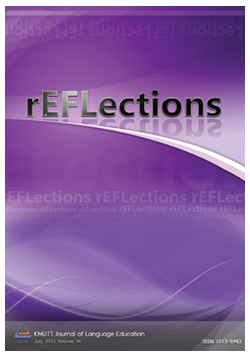The Pronunciation of English by Students in Guangxi, South China
Main Article Content
Abstract
This paper analyses the pronunciation of 24 students in Guangxi, South China, based on their reading a short text. It reports that the occurrence of [w] in place of /v/ is one of the most salient features of their pronunciation. In addition, they tend to use [s] for voiceless TH and [d] for voiced TH, omit dark /l/ in the coda of words such as full and wolf, merge long and short vowels such as fleece and kit, and use full vowels in function words such as ‘to’ and ‘as’. However, they tend not to insert a vowel at the end of words such as ‘and’, a feature reported for the English spoken in
other parts of China, and the incidence of stressed pronouns at the end of a phrase is less than reported elsewhere. We can therefore conclude that some features are shared with the rest of China, but at the same time some features seem to mark the English of Guangxi as distinct from the English of the rest of China.


